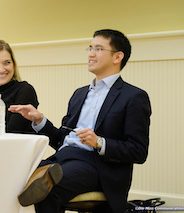Anthony Yuen – Alumnus Spotlight
,
Hometown: Hattiesburg, MS
BA International Studies and Chinese (2008)
LinkedIn
Drawn to the Chinese Language Flagship Program, the Croft Institute of International Studies, and the Sally McDonnell Barksdale Honors College, Yuen found at UM a unique opportunity to pursue multiple intellectual passions.
With the support of the Chinese Language Flagship Program, Yuen spent a year and a half in China honing his proficiency in Mandarin and developing an expertise in China’s political, economic, and social issues. He spent his capstone year taking graduate-level coursework in foreign policy and politics – taught completely in Chinese – at Nanjing University and interned with a Chinese intellectual property law firm in Shanghai.
Yuen’s experiences in China and his Mandarin proficiency not only helped differentiate him as an applicant for both graduate studies and employment opportunities, but also formed the foundation for his career. After graduation, he moved to Thailand to study Thai, volunteer, and teach English. Yuen later earned a MA in International Affairs at Georgetown University’s School of Foreign Service.
After an internship with the U.S. Department of Treasury’s East Asia Office and a year with the U.S. Department of State’s Bureau of East Asian and Pacific Affairs, Yuen joined PricewaterhouseCoopers’ (PwC) Washington, D.C.-based Global Intelligence, Anti-Corruption and Strategic Threat Management practice group. At PwC, he led a China and East Asia-focused research and investigative team and helped establish similar teams throughout Asia. Drawing from his experiences consulting for global companies and government agencies, Yuen joined the Clinton Health Access Initiative’s malaria elimination financing team for South Africa in 2018.
Why study Chinese at UM?
“The program is well designed to pair both intensive Chinese language training in the classroom and immersive learning experiences in China with another academic major. This interdisciplinary approach aptly reflects the demands of today’s job market, where many employers appreciate Chinese proficiency as a critically valuable skill but also expect complementary fluency in a relevant field of study.”

